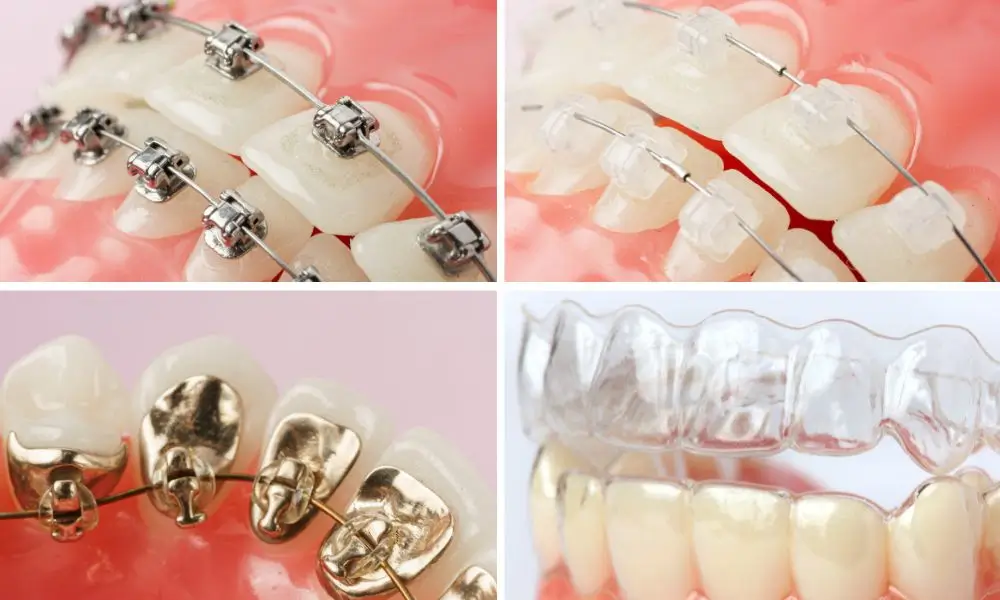Braces for Teeth: Transforming Your Smile with Dental Braces and Orthodontic Braces. Discover the benefits for a straighter smile, improved oral health, and enhanced aesthetics. Braces treatment offers long-term results, helping you achieve the smile you’ve always wanted with dental braces tailored to your needs read more.

Braces for Teeth: Why They’re the Top Choice for Straightening Your Smile?
Teeth misalignment can lead to various oral health problems, such as difficulty cleaning between teeth, uneven wear, and even jaw pain. Braces are designed to gradually shift teeth into a better alignment, not just for cosmetic improvements but for functional health benefits as well read more.
Improved Oral Hygiene and Reduced Risk of Dental Issues
When teeth are properly aligned, it’s easier to brush and floss effectively, reducing the risk of cavities, gum disease, and tooth decay. Misaligned teeth can create hard-to-reach spots, leading to the buildup of plaque and bacteria. By straightening teeth with braces, patients are more likely to maintain better oral hygiene.
Correcting Bite Issues
Braces are also effective at addressing bite problems, such as overbite, underbite, and crossbite. These conditions, if left untreated, can lead to jaw discomfort, excessive tooth wear, and difficulty chewing. Braces help align the teeth and jaw, improving bite function and comfort.
Types of Dental Braces and How They Work
There are several types of braces available today, each with its unique features and advantages. Choosing the right one depends on the severity of the dental issue, personal preferences, and the recommendation of your orthodontist.
Traditional Metal Braces
Traditional metal braces are the most common and well-known type. They consist of metal brackets, wires, and rubber bands that apply constant pressure to gradually shift teeth into place. Despite their visibility, they are highly effective and often the most affordable option.
Ceramic Braces
Ceramic braces work in a similar way to metal braces but are made from clear or tooth-colored materials, making them less noticeable. They are a popular choice for those who want the effectiveness of traditional braces but prefer a more discreet option.
Invisalign (Clear Aligners)
For those who prefer a virtually invisible treatment, Invisalign clear aligners are a popular alternative. These custom-made, transparent trays fit over the teeth and gradually shift them into place. Invisalign is removable, which makes it easier to maintain oral hygiene and enjoy a wider variety of foods during treatment.
Lingual Braces
Lingual braces are similar to traditional metal braces but are placed on the back of the teeth, making them invisible from the outside. While they are effective, they can be more challenging to clean and may cause some initial discomfort.
The Braces Treatment Process
The process of getting braces involves several stages, from consultation to the final removal. Here’s a general overview of what to expect:
Initial Consultation and Planning
The first step is a thorough consultation with an orthodontist, who will examine your teeth and take x-rays or 3D scans to assess the alignment and identify any issues. Based on this, the orthodontist will recommend the best type of braces for your needs and explain the treatment plan.
Fitting and Adjustment
Once the braces are ready, they are fitted onto your teeth. During this stage, the orthodontist will place brackets on each tooth and connect them with wires. Regular adjustments are necessary to ensure the braces are working effectively and to gradually move the teeth into the desired position.
Retainers After Treatment
Once the treatment is complete and the braces are removed, patients are usually required to wear a retainer. Retainers help maintain the new position of the teeth and prevent them from shifting back to their original alignment.
Benefits of Wearing Braces
Braces offer numerous advantages that extend beyond the aesthetic appeal of a straighter smile. Here are some of the key benefits:
Boosting Confidence and Self-Esteem
A straight smile can significantly boost a person’s self-confidence. Many patients report feeling more comfortable in social and professional settings once their teeth are aligned. The psychological benefits of braces can positively affect a person’s self-image and overall quality of life.
Long-Term Oral Health Improvements
Braces not only straighten teeth for a better appearance but also improve oral health in the long run. Proper alignment prevents wear, cavities, and gum problems that may arise from misaligned teeth. Braces help create a healthier foundation for a lifetime of optimal dental health.
Preventing Future Dental Problems
Braces can also prevent future dental issues. By correcting misalignments early on, patients are less likely to experience complicated dental problems later, such as jaw pain, tooth erosion, or gum disease.
How Long Does Braces Treatment Take?
The duration of braces treatment depends on several factors, including the severity of the misalignment, the type of braces used, and how well the patient follows the orthodontist’s instructions. On average, treatment lasts between 18 months and 3 years. Regular visits to the orthodontist for adjustments are necessary throughout this time.
Factors Affecting Treatment Time
Certain factors, such as age, the complexity of the case, and how much tooth movement is required, can influence the treatment time. Younger patients tend to experience quicker results, as their jaws and teeth are still developing. Adults may need a longer treatment time due to more rigid bone structures.
Aftercare and Maintenance of Braces
While wearing braces, it’s essential to follow proper aftercare guidelines to ensure the best results. This includes:
- Maintaining good oral hygiene: Regular brushing and flossing are crucial to avoid plaque buildup around the braces.
- Avoiding hard or sticky foods: Certain foods can damage the braces or get stuck between the wires, hindering progress.
- Wearing retainers: After the braces are removed, wearing a retainer as prescribed helps to ensure the teeth stay in their new position.
The Future of Braces
Advances in dental technology continue to improve the braces experience. Today, we see innovations such as 3D scanning for more precise fittings, clear aligner technology, and faster treatment options. The future of braces looks even more promising, with quicker treatments, enhanced aesthetics, and better patient comfort on the horizon.

